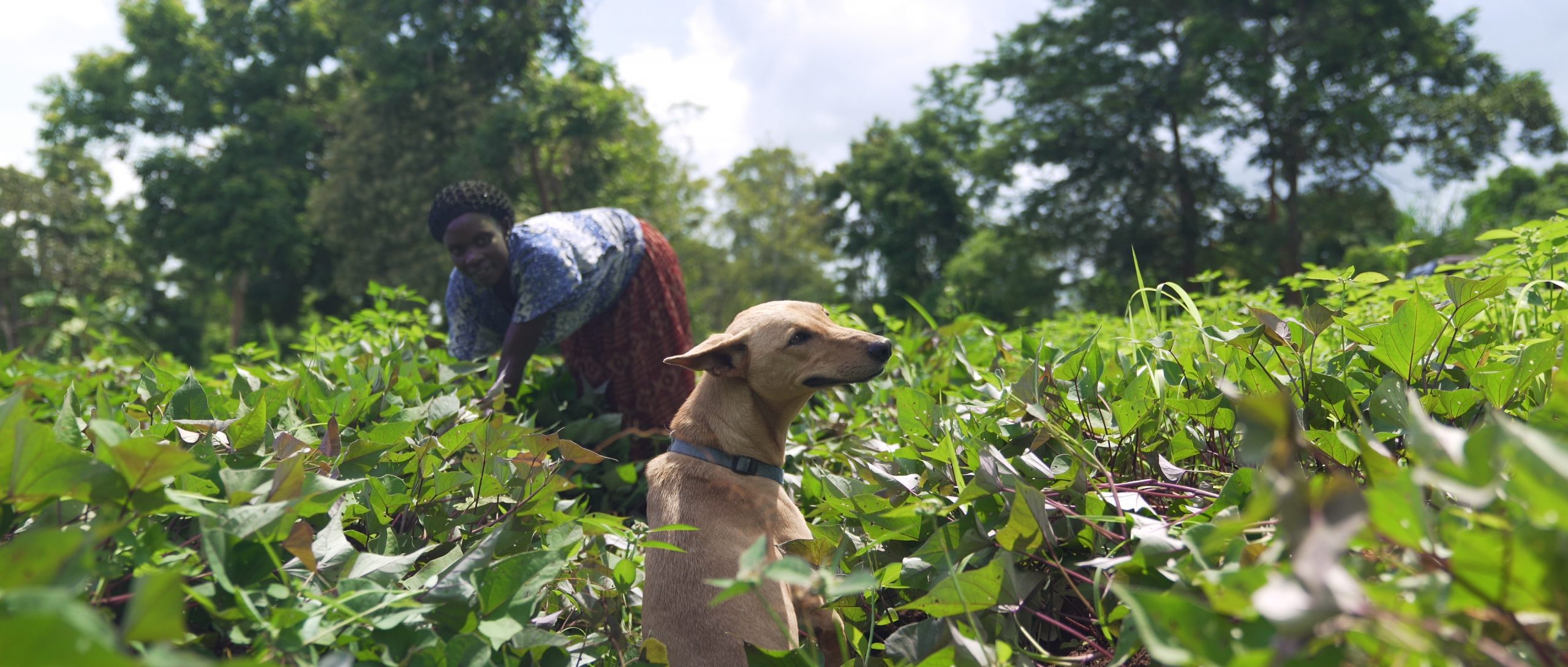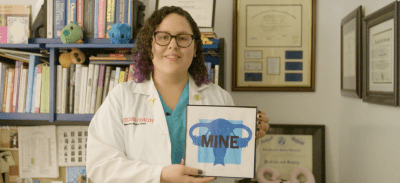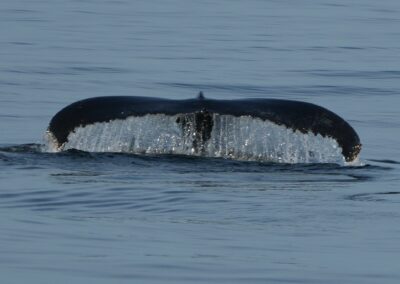Here’s proof that ‘We Don’t Deserve Dogs’
Park Slope filmmakers Matthew Salleh and Rose Tucker discuss their documentary about man’s too-good-for-us friend
Major, a stout and stately bull terrier with a dignified snout, sits curled on the woody floor of a Scottish pub. He looks on as his owner sips a pint. At the risk of anthropomorphizing, there is something unmistakable in Major’s gaze: It’s love. As it happens, Major is the literal poster-pooch for “We Don’t Deserve Dogs,” the latest documentary from Brooklyn-based indie filmmakers Matthew Salleh and Rose Tucker.
As the title suggests, “We Don’t Deserve Dogs” explores the relationship between us humans and our canines. Shot on Cinemascope—a super wide lens—the film unpacks, prods and details the intimate bonds that link man and his best friend across 11 countries (the U.S. isn’t one of them). From a puppy birthday party in Peru to truffle-hunting dogs in Italy, it is a love that transcends culture and language. What did we do to deserve our doggos?
Salleh shoots and directs, Tucker records sound and produces, and the couple edits together from their one-bedroom apartment in Park Slope. “We Don’t Deserve Dogs” is available for viewing online on Amazon, Vimeo, YouTube, and elsewhere.
Check out the official trailer here.
We Don’t Deserve Dogs from Urtext Films on Vimeo.
The duo sat down with Brooklyn Magazine to talk about dogs, which we definitely do not deserve, and the production of an indie doc in a pandemic year.
So do you have a dog at home?
Rose Tucker: I wish we had a dog at home! At the moment we’re renting in Park Slope and we’re not meant to have a dog in this apartment. But more importantly, we usually travel all the time so it makes it a bit irresponsible to have a dog. Growing up in Australia, we always had pet dogs. We always had Labradors in my family.
Matthew Salleh: There’s other people in this building that have dogs and so we are friends with them instead.
Why make this movie now?
RT: We like making movies about simple things that people are really passionate about. So our previous film was about barbecue culture around the world—it’s one of those subjects that people just get really excited about. And dogs are a similar kind of thing: No matter where you go in the world, everyone’s got dogs. And they love their dogs.
MS: And they love talking about them. When people want to tell stories, you usually get a pretty good documentary. We have done a bit of traveling with our previous film and we also noticed that a lot of cultures have this one animal that they have chosen to be their companion, so I thought it was interesting to explore not just the similarities between the human-dog bond across the world, but also a way to celebrate the differences between cultures as well.
How did you select what countries you went to and what people made it into this film?
RT: We wanted it to be as geographically broad as possible and we wanted to go to places where people might not think about what dog culture might be like. We all know what it’s like to have a dog in Australia or the U.S., so we intentionally decided not to film in those places. The most important thing we did was hire researchers in the different locations that we wanted to film in. Those people live there, they know their cities, and we hired them to find us some amazing dog stories.
Was it a challenge to work with non-human subjects?.
MS: Don’t they say that thing: “you should never film with children or animals?” or something like that. It was a lot of fun. You’d have these ridiculous moments, like with Shen, the dog walker in Istanbul. We would be running down the road with our camera and he’d be following with 20 dogs. They control the story a lot, so you have to shoot a lot of footage. Dogs will also just do these perfect little things. I remember we were following Chino, a community dog in Chile, and he’d wait for the light to change, and then run across [the street].
RT: Matt shot a lot of it from dog’s-eye view, down there at their level. We captured some beautiful little moments where dogs are looking at their person. The look on their eyes is just gorgeous. In the pub in Scotland, we got beautiful footage of Major the rescue dog just staring at his foster mom with such love. She had no idea that that’s what he was doing while she was having a beer at the pub.
Did you notice a certain universality about the human-dog relationship across the different places you visited?
RT: Definitely, certain universal things, but there’s a lot of differences as well. Some of the places we filmed, dogs are kept less as pets, and more as guard dogs. For example, in Uganda, in rural areas, not that many people have dogs as pets. So that’s a very different kind of relationship. One of the best lines in the whole film comes from Lucy, a former child soldier in Uganda, where she says, “I didn’t know dogs can be trained to be your friend.”
Where do you think the best place in the world for a dog to live is?
MS: Ah, that’s tough.
RT: Yeah, because you could go either way with it. You could have a totally pampered lifestyle. Or you could go freer.
MS: Italy or Romania—anywhere with big mountains. Dogs seem to love mountains.
RT: But then, you know, from a Western perspective, that might look like a pretty rough life. So maybe it’s the life of a Maltese in Peru, who gets pampered and thrown birthday parties, they seem to love it.
MS: It was fascinating that dogs could be very happy in very crowded places. Because I am coming from Australia, I always assumed that dogs love rural environments. But then you see them hanging out in a park in Lima at a birthday party having the time of their lives. And so I think dogs can find happiness anywhere.

Dog people: Tucker, left, and Salleh
Can you speak more about your process and working with so many different languages?
MS: We worked with dozens of translators all over the world, to translate all the raw interviews, something like 100 hours. Everyone in the film talks in their own language, they have agency in their own story. Someone will tell a story, and you get a rough translation on the day, but then the detailed translation comes back and it’s got all of this information. I remember, for example, when we were filming with Chino, the dog in Santiago, there was one point where he just laid on his back for about half an hour. We poked him like, “Are you okay?” And he just stayed on his back. And we’re like, “That’s weird.” Something we had missed in translation from an interview was like, “Oh, he’s really your friend and he’s really taken you in when he lies on his back.” And we found that six months later when we got the notes back. We were like, “Oh, Chino liked us!” This sort of richness comes out of it.
There’s a scene in Vietnam where people use dogs as meat. What kind of consideration had to go into filming that?
MS: When we told people we’re doing a film about dogs around the world, the first question nearly everybody had was, “Are you going to do dog meat in particular Asian countries that eat dogs?” And it would have been really easy just to say, “No, we’re doing a cute little dog film.” But ultimately, we wanted to do this relationship about humans’ connection to the natural world, through dogs—and animals-as-meat is a big part of that. It felt like it was something that was necessary. To people in Vietnam that we worked with, that’s just an everyday part of life to them.
Did you learn anything new throughout this process—about either dogs or humans?
RT: It reinforced the idea that dogs don’t care what you’ve done in your past. They don’t care if you’re a good person, a bad person, they will love you regardless.
How the pandemic affected the film’s rollout?
RT: We were really, really lucky that we finished filming at the end of 2019. And then we were really, really unlucky that our world premiere at South by Southwest got canceled.
MS: As completely independent filmmakers, kicking off in a big way is important. The last film [Barbecue (2017)] we had this big kick off at South by Southwest and then sold it the next day to Netflix. Long story short, we basically had to hibernate with the film for a year while we sorted it all out.
RT: It’s just not the same. Having people watch your film online, there’s no interaction with the audience, it’s nothing like being in a cinema full of people and coming out and doing a Q&A at the end of the film.
What is it like being a creative in Brooklyn right now? Are you feeling isolated?
RT: Well, the funny thing is, we’ve always been quite isolated. When we’re still new to New York—we’ve only been here four and a half years. We’ve always worked up quietly away in our own little corner, but 2020 was meant to be a year of getting out there and making connections with other creatives. Yeah, that didn’t happen.
MS: As soon as this pandemic hit, people in Australia were like, “why aren’t you coming back home?” They hear these horror stories in the news of this dystopian-Mad Max-world that New York was supposed to be. And I think that belies what really is what makes Brooklyn work.


You might also like 


























